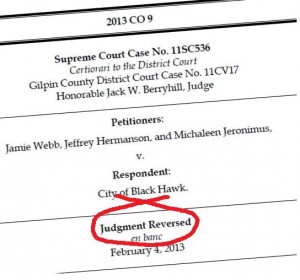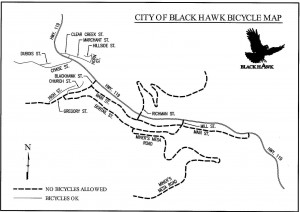Sometimes it’s worth fighting that ticket all the way to the Supreme Court.
 Three Colorado bicyclists, supported by the advocacy group Bicycle Colorado, learned that on Monday.
Three Colorado bicyclists, supported by the advocacy group Bicycle Colorado, learned that on Monday.
Not only were their tickets thrown out, but a local law that might have had dire consequences as a precedent against bicyclists’ rights also was thrown out.
The Supreme Court on Monday ruled that the bicycle ban on roads in Black Hawk conflicted with state law that allows cities and municipalities to ban bicycles on streets and highways only “where suitable bike paths … have been established on the right-of-way or parallel to it within 450 feet of the right of way of heavily traveled streets.”
“Because Black Hawk’s ordinance conflicts with a specific statutory provision in a matter of mixed state and local concern, it is preempted.”
The city, which has fought the challenge every step of the way, issued a press release on Monday that said it would “comply with the ruling.”
It’s always a good idea to comply with a Supreme Court ruling.
The city — which in 2011 earned $550 million in adjusted gross proceeds from gambling — has no plans to build a bike path, according to the Boulder Daily Camera.
Back in 2010, the small gambling town of Black Hawk in the mountains west of Denver enacted a law that banned bicyclists from riding on most streets in the town. It meant that anyone passing through town on a bicycle would have to walk, because of the way the town is laid out and the prohibition.
The city manager said it was a safety issue because of the glut of tourists and tour buses that visit the town’s narrow streets. Oddly, the law didn’t apply to local residents whose bike rides originated within the city.
A few months later, three bicyclists — Jamie Webb, Jeffrey Hermanson, and Michaleen Jeronimus — on a long-distance ride to pedaled into town on their bicycles. They were pulled over and a policeman issued each one a $68 ticket.
The news outraged bicyclists across Colorado and the nation. If one town could ban bicycling on public roads as a safety issue, then it could happen anywhere.
In fact, the issue cropped up a few months later in Missouri, where a county tried to ban group rides on its roads. Opposition to that measure killed it.
But the Black Hawk city council wouldn’t give in, even after protests at the state capitol. The City Council even contracted an after-the-fact engineering study to support their safety findings. Bicycle Colorado helped support the cyclists through the court system, and the city fought it every step of the way.
Meanwhile, the controversy led to boycotts by bicyclists. The Bicycle Tour of Colorado even had to hire shuttle buses in 2011 for cyclists who didn’t want to break the law by riding through town.
The Supreme Court ruling said it wasn’t just a local issue, but a state issue. The court also noted that the bicycle ban also affected nearby Central City, because bicyclists could only get there by walking through Black Hawk.
Justice Gregory Hobbs wrote:
“There is a ‘ripple effect’ presented by the ordinance affecting communities beyond Black Hawk. Bicyclists migrate to our state roadways and mountain towns in the summer and autumn months in search of recreation and scenery. The ordinance effectively closes off the neighboring town of Central City from receiving bicycle traffic on connected routing of long-distance bicycle rides and may also affect a bicyclist’s decision to visit other mountain towns, such as Nederland, that benefit from recreational tourism.
“Because of Black Hawk’s ordinance and strong negative public perception of the bicycle ban, especially be bicyclists, the ordinance will likely cause future bicycle tours to bypass the area entirely.”
You can read the Black Hawk ruling at the Supreme Court website.


1 pings
[…] bicycle advocacy shows that bicycle bans don’t stick. Just ask officials in Black Hawk, CO (“Victory! Colorado Supreme Court overturns Black Hawk bicycle ban”), and St. Charles County, MO (“Bicycle ban on roads in Missouri county fails to […]